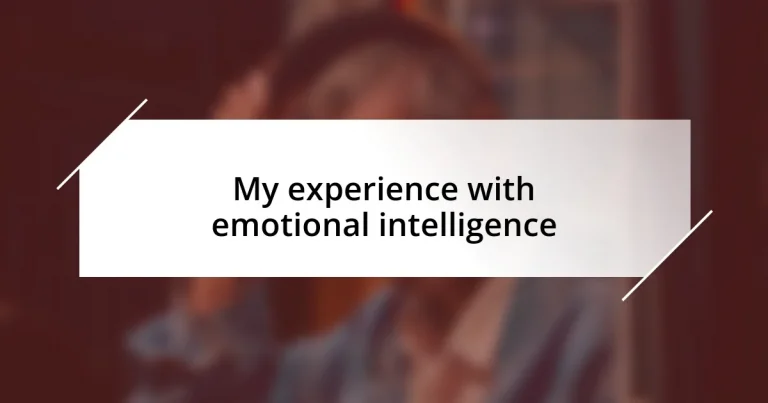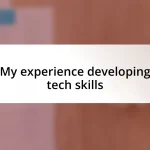Key takeaways:
- Emotional intelligence involves recognizing and managing one’s own emotions as well as empathizing with others, enhancing interpersonal relationships.
- Practicing self-awareness and self-regulation can help navigate challenging situations and improve decision-making.
- Fostering emotional intelligence within teams leads to better collaboration, conflict resolution, and creative problem-solving.
- Future growth in emotional intelligence can be supported through education, workplace training, and technology that aids self-reflection.
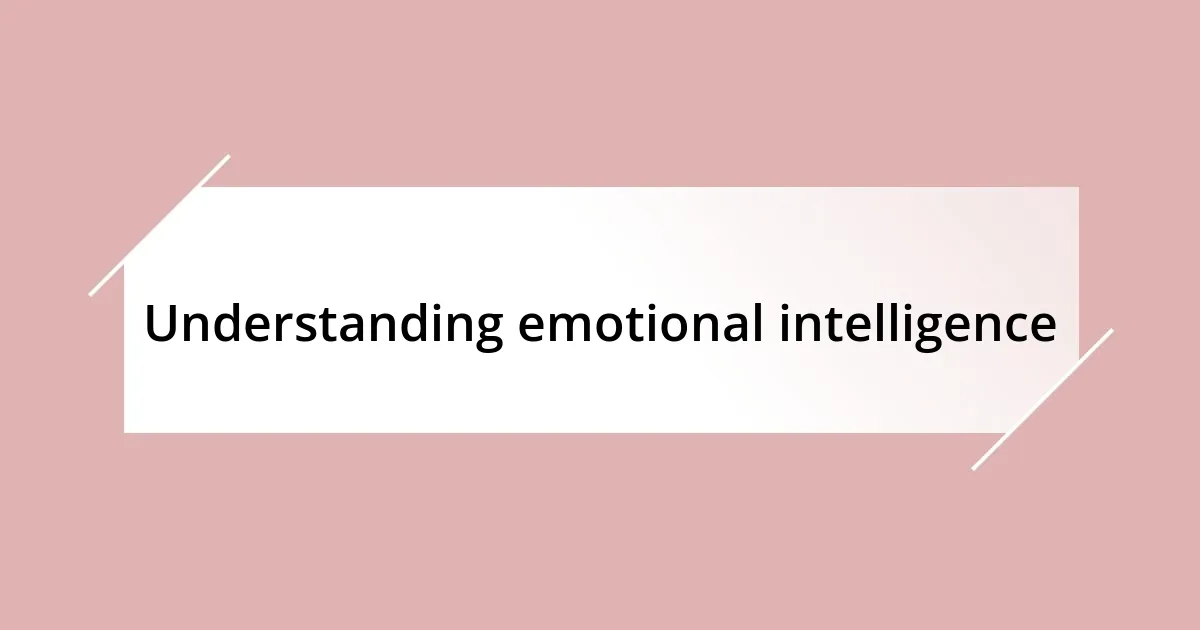
Understanding emotional intelligence
Emotional intelligence is often described as the ability to recognize, understand, and manage our own emotions while also empathizing with others. I vividly remember a time when a close friend was going through a tough period. Instead of offering empty platitudes, I tapped into my emotional intelligence; I asked questions, listened intently, and created a safe space for her to express her feelings. That experience taught me how powerful emotional awareness can be—not just for ourselves, but for others as well.
Have you ever noticed how our emotions can influence our decisions? There’s a clear connection between how we feel and how we act. I once faced a challenging situation at work where my frustration was palpable in meetings. Recognizing this, I made a conscious effort to manage my emotions, leading to a more collaborative atmosphere. It sparked a revelation for me: by harnessing emotional intelligence, we can redirect our emotional responses to positively impact our interactions.
Learning to navigate emotional intelligence feels like cultivating a garden—it requires patience and care. I still recall my initial struggle with understanding my emotions; I often felt overwhelmed. However, as I started journaling about my feelings, I began to see patterns. This practice allowed me to recognize triggers and better understand my emotional landscape. Isn’t it fascinating how such self-reflection can lead to growth and deeper connections with others?
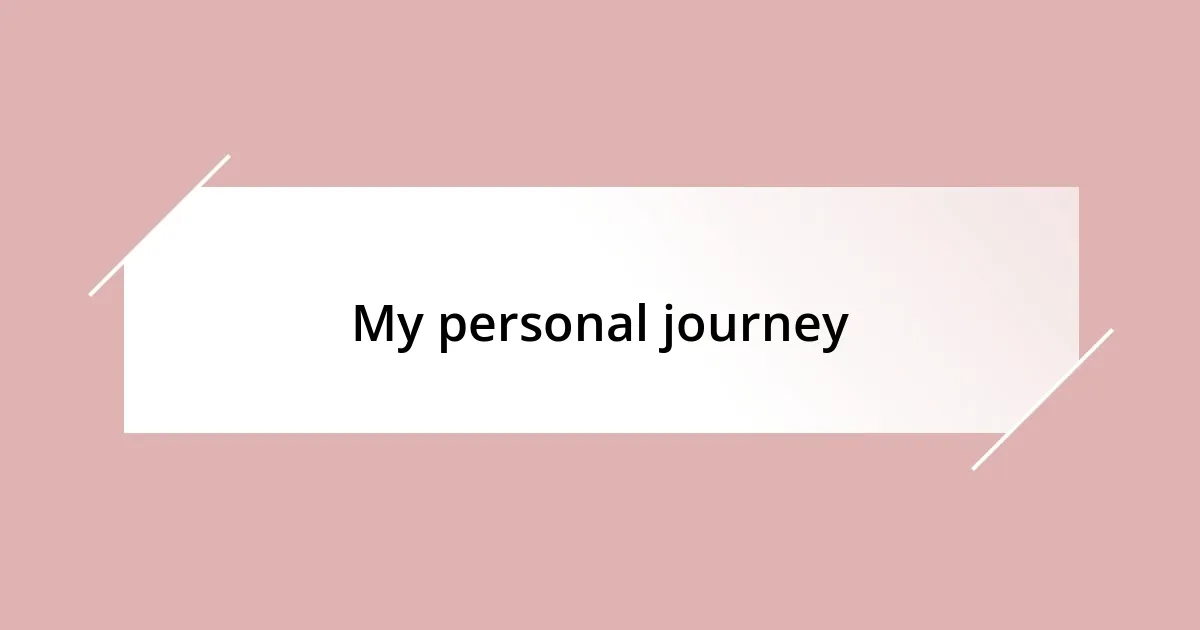
My personal journey
Embracing emotional intelligence has truly been a transformative journey for me. I remember a day at a family gathering where tensions were running high due to unresolved issues. Instead of reacting impulsively, I decided to practice patience. I took a step back, assessed the emotional dynamics at play, and initiated a heartfelt conversation. This experience revealed to me how emotional intelligence can genuinely diffuse conflict and foster connection within my family.
There was also a time when I volunteered at a local community center. I interacted with individuals from diverse backgrounds, each carrying their own emotional baggage. In this setting, I learned to be mindful of non-verbal cues—how body language and facial expressions often communicate more than spoken words. By paying close attention to these signals, I was able to connect on a deeper level, often anticipating needs before they were verbalized. It underscored the idea that emotional intelligence isn’t just about understanding oneself; it’s also about being attuned to the emotions of others.
Reflecting on my professional life, I’ve noticed how my emotional intelligence has enhanced my leadership skills. I recall leading a project where team morale was low. Rather than focusing solely on tasks, I invested time in connecting with each team member, acknowledging their frustrations. I shared my own challenges too, which opened the door for honest conversations. This approach not only boosted team morale but also fostered accountability and shared ownership. It proved to me that emotional intelligence lies at the heart of effective leadership.
| Key Experience | Emotional Insight |
|---|---|
| Family Gathering | Conflict resolution through patience and understanding. |
| Community Center Volunteering | Importance of non-verbal communication in building connections. |
| Leading a Project | Strengthening team morale through open conversations. |
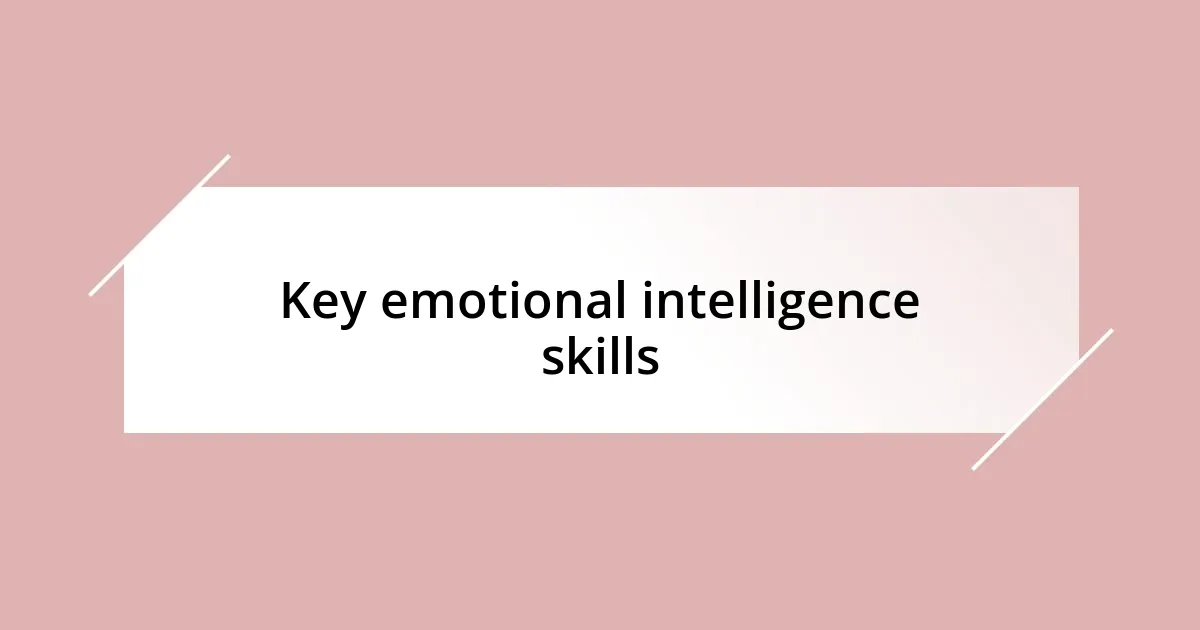
Key emotional intelligence skills
One of the key emotional intelligence skills I’ve honed over the years is self-awareness. There was a moment during a particularly hectic week when I felt my stress levels rising. Instead of getting caught up in the whirlwind, I took a moment to step aside and breathe. This simple act helped me identify my feelings and understand what was driving my anxiety. By acknowledging my emotional state, I was able to approach a critical situation later with a clearer head and a more positive outlook.
Here’s a quick list of essential emotional intelligence skills that can transform our interactions:
- Self-Awareness: Recognizing and understanding our emotions to make informed decisions.
- Self-Regulation: Managing our emotions effectively, especially in stressful situations.
- Empathy: Understanding and responding to the emotions of others, fostering stronger connections.
- Social Skills: Building relationships and working collaboratively, essential for teamwork and leadership.
- Motivation: Harnessing our emotions to drive personal and professional goals.
Fostering these skills is like adding tools to our emotional toolbox. I remember a time at work where I practiced empathy while navigating team dynamics. Listening deeply to my colleagues’ apprehensions enabled me to address unspoken concerns and create an environment of trust. This experience opened my eyes to the immense value that empathy adds, not just in my relationships but also in achieving common goals.
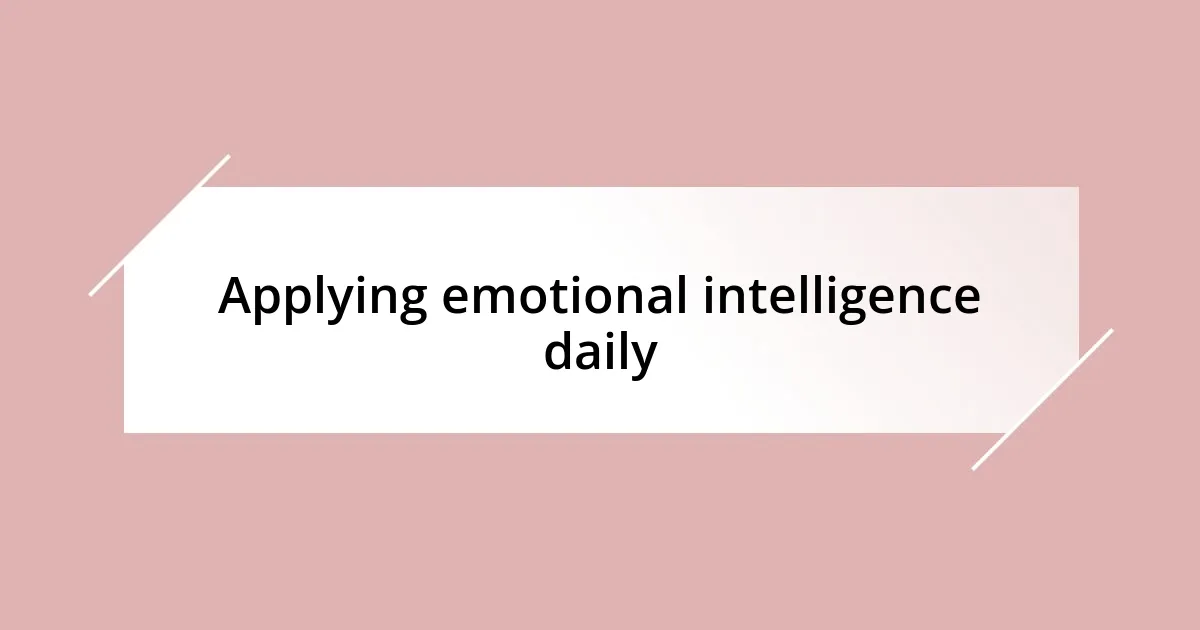
Applying emotional intelligence daily
Applying emotional intelligence daily has truly become a fundamental part of my life. Every morning, I set aside a few minutes to reflect on my current emotional state. I ask myself, “How am I feeling today?” This practice not only grounds me but also prepares me to navigate whatever challenges come my way. I find that starting the day with this level of self-awareness has made me more adaptable and responsive throughout the day.
In social situations, I try to focus on truly listening to others instead of letting my mind race ahead with what I want to say next. Recently, at a friend’s gathering, I noticed someone sitting alone, seemingly lost in thought. I took the time to approach them, genuinely asking about their feelings. What started as a simple conversation revealed that they were struggling with some personal issues. My willingness to listen opened a door for connection that I hadn’t expected. It makes me wonder—how often do we miss those opportunities to connect because we’re too busy?
At work, I’ve learned that checking in with my team isn’t just about project updates but understanding how they’re feeling. There was a time when we were behind on deadlines, and it was clear that the pressure was affecting everyone. Instead of diving right into solutions, I arranged a casual team huddle where we could express frustrations and brainstorm together. This approach transformed the atmosphere from tense to collaborative. I’ve seen firsthand how prioritizing emotional understanding in daily interactions can lead to a more supportive and effective work environment. What do you notice when you prioritize the emotions around you?
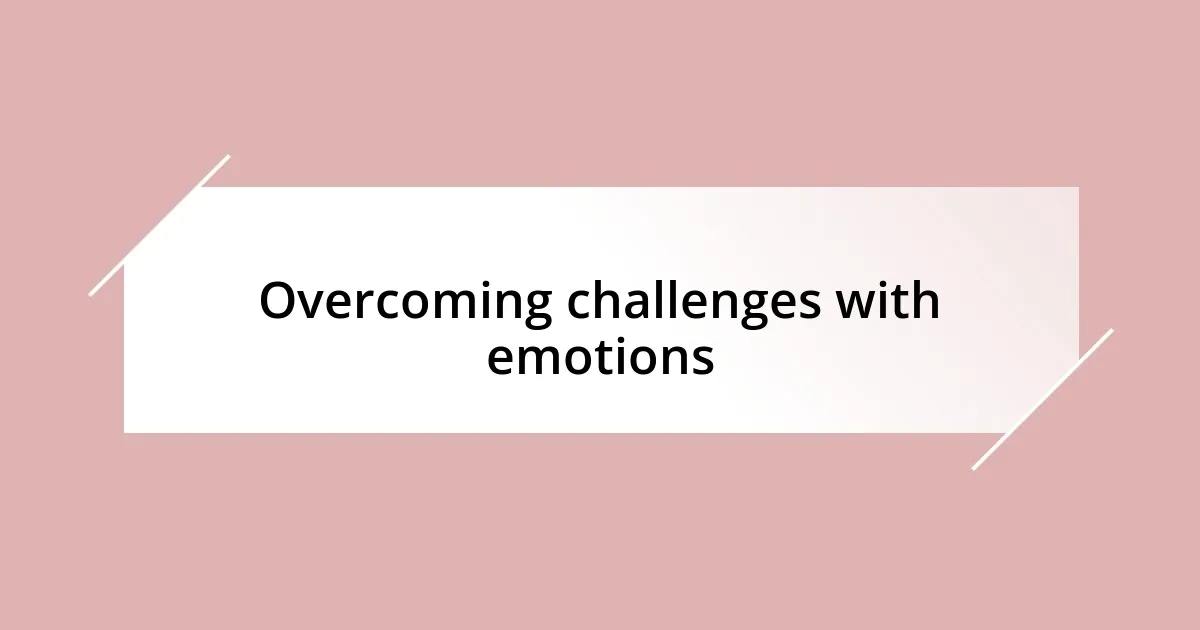
Overcoming challenges with emotions
As I reflect on overcoming challenges with emotions, I remember a tough time in my life when I faced unexpected setbacks. I found myself feeling overwhelmed with frustration and self-doubt, which only added to my anxiety. Instead of letting those emotions derail me, I decided to reframe my mindset. I started viewing setbacks not as failures, but as opportunities for growth. This shift allowed me to approach obstacles with a newfound resilience.
Another instance comes to mind when I was tackling a project that required immense collaboration. One evening, tensions were high during a discussion, and disagreements erupted. I took a deep breath and reminded myself to respond rather than react. Instead of escalating the situation, I shared my perspective while actively listening to others. I noticed how taking a moment to manage my emotions not only diffused the tension but also led to a more innovative solution. Isn’t it fascinating how a simple pause can reshape the dynamics in a room?
Taking time to process my feelings has been a game-changer too. There was a day where the weight of multiple responsibilities left me paralyzed. Instead of pushing through, I allowed myself some quiet reflection. I wrote down what I felt — the pressures, the expectations — and this act of expressing my emotions provided clarity and direction. It made me realize that embracing discomfort could lead to powerful insight and, ultimately, to better decision-making. Do you ever find that acknowledging your feelings allows you to see the situation in a new light?
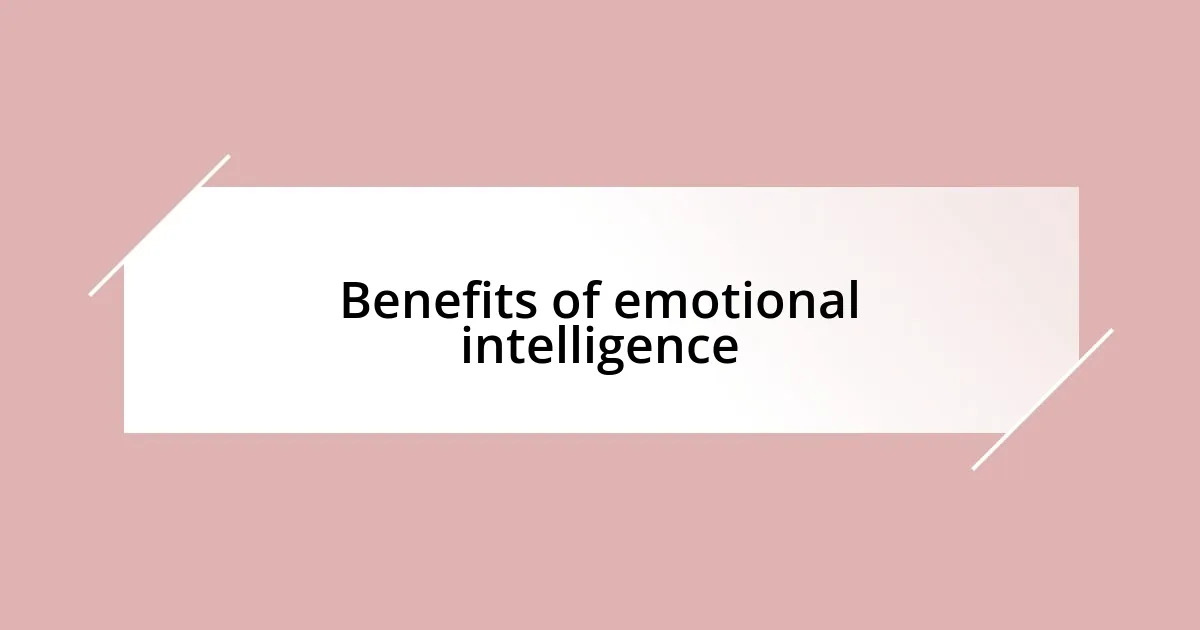
Benefits of emotional intelligence
Understanding the benefits of emotional intelligence has transformed how I approach relationships in my life. One moment that stands out was during a conflict with a family member. By taking a step back to acknowledge not just my feelings but theirs, I noticed an immediate shift in our conversation. Instead of defensiveness, we reached a deeper understanding. This taught me that fostering empathy through emotional awareness can mend relationships and strengthen bonds.
In my professional life, I’ve experienced how emotional intelligence enhances teamwork and collaboration. I recall a project where everyone was stressing over tight deadlines. Instead of pushing harder, I suggested a casual lunch meeting, where we could share our feelings about the workload. That openness led to a brainstorming session filled with creative ideas. It’s incredible how addressing emotions directly can pave the way for innovative solutions. Have you ever thought about how sharing vulnerabilities in a team can spark collaboration?
Additionally, I’ve found that emotional intelligence plays a significant role in personal growth. There was a time when I felt stuck in my career, unsure of my next steps. By tracking my emotions and understanding the underlying causes, I could pinpoint what truly mattered to me. This self-awareness prompted me to seek opportunities that aligned with my values rather than simply progressing for the sake of it. Isn’t it amazing how understanding ourselves better can lead to more intentional life choices?
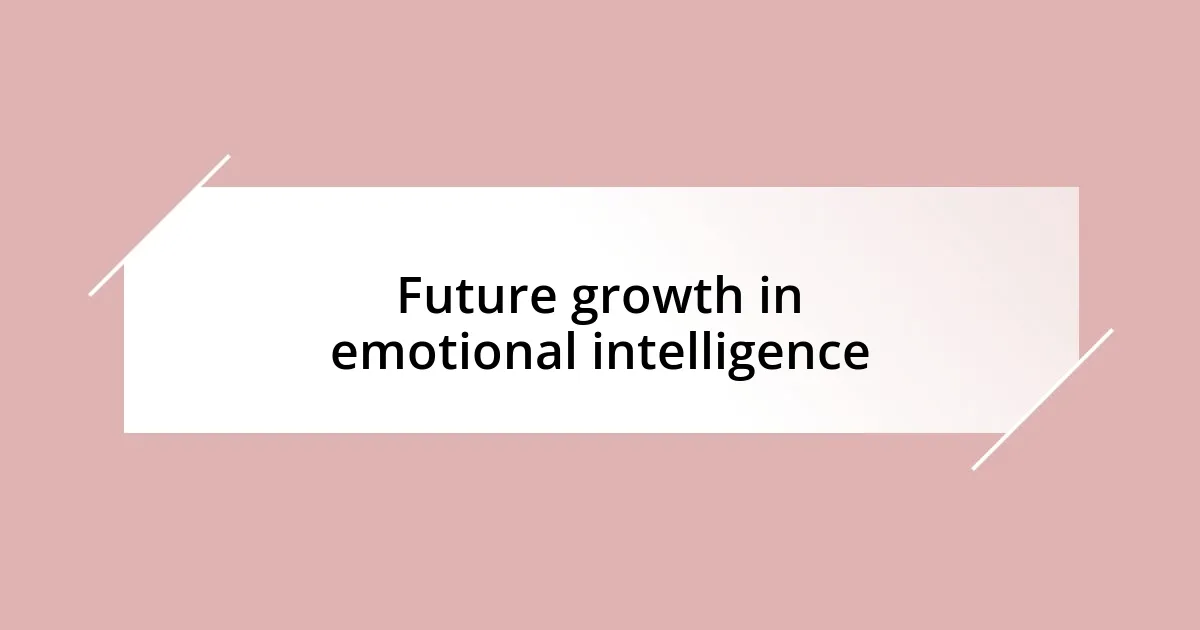
Future growth in emotional intelligence
As I look ahead, I can’t help but feel excited about the future growth of emotional intelligence. I recently joined a community workshop that focused on emotional awareness, and it was refreshing to see so many people genuinely eager to explore their feelings. The enthusiasm was palpable! This eagerness bodes well for a future where emotional intelligence becomes a priority in education and workplaces alike. Don’t you think that encouraging emotional awareness from a young age will lead to more empathetic adults?
In my experience, the integration of emotional intelligence training within corporate environments is another area ripe for growth. I remember a company I worked with implementing an emotional intelligence program. The impact was astounding—not just in team dynamics, but also in employee satisfaction. This investment in emotional development created an atmosphere where individuals felt valued and understood, fostering collaboration. If more organizations follow this trend, imagine the positive shift in workplace culture!
Moreover, the role of technology in enhancing emotional intelligence is fascinating. I recently explored apps that help track moods and emotional patterns, and I found them incredibly helpful for self-reflection. As these tools continue to evolve, they could potentially empower more people to understand and manage their emotions effectively. Isn’t it intriguing to think how technology could serve as a bridge to greater emotional awareness?












